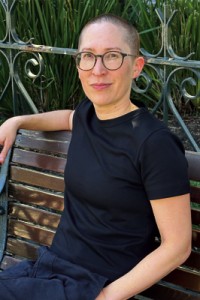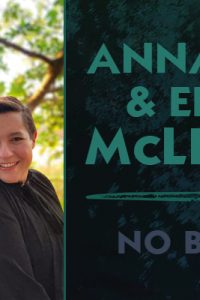Kameron Hurley: The Future Is Intrinsically Hopeful
 I recently finished the first draft of a long-overdue fantasy novel called The Broken Heavens, last in a trilogy. Instead of celebrating, however, I found myself filled with post-post weariness. Endings are bittersweet, and this one was especially so. While I began writing this series in earnest about ten years ago, the kernel of its idea – a world where the invaders were alternate versions of the protagonists – had been with me for over 20 years.
I recently finished the first draft of a long-overdue fantasy novel called The Broken Heavens, last in a trilogy. Instead of celebrating, however, I found myself filled with post-post weariness. Endings are bittersweet, and this one was especially so. While I began writing this series in earnest about ten years ago, the kernel of its idea – a world where the invaders were alternate versions of the protagonists – had been with me for over 20 years.
In this rapidly changing world, a decade can seem like a century. Two decades is a lifetime. On completion of this last volume, then, I found myself looking back at how much my writing has changed as the world moved around me. The truth is we cannot divorce our work from the wider world. What this series meant, its themes, and the ultimate choices the characters make in the end, were vastly influenced by how society has shifted around me.
As I’ve grown as a writer and a human being, existing in an uncertain time – with climate change and nationalism threatening to re-forge the landscape of human civilization as we know it – my outlook on the world and the genre has shifted from one of distaste for all things sweet and syrupy to embracing the moral compass and real heroics of the people around me. We are not all angry nihilists. In fact, the ones who will keep going longer are the ones with something to believe in.
I’m no longer convinced it’s a radical idea to believe that there are no heroes and that humanity can be reduced to its very worst impulses. It’s not particularly exciting or edgy to insist we’re all going to blow ourselves to bits, or war against our neighbors in some libertarian apocalypse scenario where readers of Ayn Rand are poisoning their food supplies to keep the remnants of humanity from stealing their stuff.
Humanity didn’t survive this long because of its worst impulses. We survived this long because, despite all of that, we learned how to work together. Being grim and nihilistic is boring.
Being grim isn’t how you create the future. Being grim means rejecting the idea of a future altogether. I would rather seek to understand why some people choose to do the right thing even when it’s not popular, even when the world is collapsing all around them.
As the world around me gets darker and less hopeful, reflected back at me by a profoundly warped media machine, I’ve found my writing to be a perfect outlet for exploring how people can still make good decisions in bad situations. The characters in my military science fiction novel, The Light Brigade, are all genuinely good kids who think they’re doing the right thing. The heartbreaking part is watching them face impossible choices and still get out of the novel with some shred of humanity intact. Spoilers: it can be done, but it required me to channel what is best in people. It required me to believe that hate is less powerful than hope, and believing in that felt edgy as hell.
What a time to be a creator, when believing humanity has a future that is not just a series of dystopic post-apocalypse nightmares is the most radical position one can have.
I have always sought to explore the fringes of the science fiction field. If you think you’re working at the horizon, but the rest of the field feels you’ve become mainstream, you’ll find yourself a bit disconnected, as I have. If you’re writing a dystopic nightmare, welcome. There’s a lot of them out there, including some of mine. What do you have to say that’s truly radical?
This was where I found myself this last year, trying to complete the arc of a series about genocide and the terrible things we will all do to save ourselves. Our worst impulses are never confined to history. They are seething and surging and simmering all the time. What keeps them in check, if anything? My argument ten years ago was that nothing could stem the tide of our awful choices, that we would always find ourselves in situations where we only had terrible options. And if we only ever had terrible options, then we were all the bad guys.
What I’ve discovered is that it’s this either/or thinking that’s poisoned how I see the world. There are never just two bad choices. There are multiplicities of choices. It’s our brains, our politics, our societies that try and tell us we can choose security or freedom, absolutely unfettered speech or complete censorship, fascism or communism.
Real life is muddier than that, and so are the choices that bring us forward, up and away from a nihilistic future.
Those are the sorts of choices I want to write more about – the choices between, among, beyond the presented ones. What I’ve learned is that the choices presented to us are often complicit in upholding the status quo while giving us the illusion of choice. It’s like playing the video game where you get three different dialogue options that all lead to the same result.
We understand that much of the artistic process is about self-expression, about saying: “This is how the world feels to me.” But what if we frame this differently? What if what we are presenting to our audiences, as artists, is “This is how the world could be really different. Have you thought about how to get there?”
No matter how much we wish to escape our social and political realities through the writing of fiction, our realities are the lens through which we interpret and shape our fictional worlds. The challenge of writing serial work today is that the pace of change is moving so quickly that works like my essay collection The Geek Feminist Revolution – which was very timely in early 2016 – feel almost quaint here in 2019. At best our work is representative of a brief snapshot in time, a historical artifact from another age, even when that age is just a few months or years prior.
Increasingly, I find that writing any type of work at all is hopeful. We create not just for this time period, but for generations that come after us. It is profoundly optimistic to assume there is a generation after ours that will create a society one hundred years from now that is recognizable to us at all. The pace at which climate change will continue to alter our world and impact social movements cannot be truly appreciated by any current living generation. That makes my job of writing about the future a lot more difficult, but also deeply satisfying. Because by doing so I say: I believe there will be a human world after this one. I believe it will be better than what we’ve got now. I believe we can be more than the sum of our fears. I believe the world can be really different.
Every work I complete is a part of this ongoing conversation about both our present and future. It asks us to interrogate what makes us human. It asks us to imagine taking the best parts of that into the future. Because if I can change over the course of writing these novels, and help my characters overcome my own worst impulses, it must be possible in the wider world. Right?
That is what I choose to believe. That is why I keep going. That is why I believe in the future.
Kameron Hurley is the author of The Stars are Legion and the award-winning essay collection The Geek Feminist Revolution, as well as the God’s War Trilogy and The Worldbreaker Saga. Hurley has won the Hugo Award, Kitschy Award, Locus Award, BFA Award, and Sydney J. Bounds Award for Best Newcomer. She was also a finalist for the Arthur C. Clarke Award, the Nebula Award, and the Gemmell Morningstar Award. Her short fiction has appeared in Popular Science Magazine, Lightspeed Magazine, and many anthologies. Hurley has also written for The Atlantic, Bitch Magazine, The Village Voice, and Entertainment Weekly. She posts regularly at KameronHurley.com.
This article and more like it in the April 2019 issue of Locus.
 While you are here, please take a moment to support Locus with a one-time or recurring donation. We rely on reader donations to keep the magazine and site going, and would like to keep the site paywall free, but WE NEED YOUR FINANCIAL SUPPORT to continue quality coverage of the science fiction and fantasy field.
While you are here, please take a moment to support Locus with a one-time or recurring donation. We rely on reader donations to keep the magazine and site going, and would like to keep the site paywall free, but WE NEED YOUR FINANCIAL SUPPORT to continue quality coverage of the science fiction and fantasy field.







